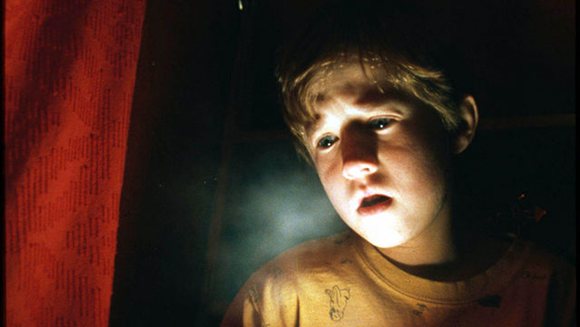 |
| Figure 1: Movie Poster [Still Image] |
After this incident, Malcolm is determined to help
cure Cole Sear, a young boy who experiences the same psychiatric symptoms as Vincent.
Cole is too young to comprehend the purpose of his paranormal powers and is
afraid to tell anyone about his suffering except to his doctor. Malcolm sees this as a
chance to make amends for not being able to help Vincent, but doubts his ability
to reach the boy, particularly when Cole claims to see ghosts who don't know
they are already dead.
The interesting visuals has helped extensively in this character driven film. Tak Fujimoto, the cinematographer, captures the mood excellently by shooting with different camera angles and shot sizes. There
are a few examples to support this statement. One of this would be where Cole is
lying on his bed. It is shot at high angle, giving the audience some sort of
authoritativeness. This is because the character is being looked down upon. It
also helps to establish the character’s age and how he positions himself while
sleeping. As for the colour used in this scene, it symbolizes several things such as blood,
horror, anger and love. It enables the audience to link it with the
narrative as colours helps to emphasize on a specific kind of emotion that the
character is going through.
 |
| Figure 2: Cole Sleeping [Still Image] |
Another scene that had a great camera angle to
express and emphasize the character’s feeling would be the use of close up as
seen in Figure 3. With the lighting from underneath and the shot taken from a distance invading the personal space, it has successfully instill the uneasiness in the scene,
just as how the character could possibly feel. Vikileaks is able to second
this point when they state “Shyamalan’s careful use of specific production
techniques lends maximum impact to his own finely crafted story, wrenching out
every fright for all they are worth." (Vikileaks, 2012)
 |
| Figure 3: Cole In His Tent [Still Image] |
Like many other great films, the sound played
an important role and contributes to piece this
film brilliantly. An example of this would be in the opening scene where,
Anna, Malcolm’s wife, goes to the basement to get a bottle of wine. She hears
nothing but she gets the chills, which shows there is some sort of supernatural
presence. The second example would be after Cole takes a wee, we hear the beat
of the music increasing, building the tension. It keeps the audience at the edge
of their seat as they waits for something to appear. Nathan agrees with the
excellent usage of sound in this film because in his review, he states “Shyamalan expertly utilises sound to enhance the
discomforting feeling of something indefinable being present (allowing the
audience its own "sixth sense")." (Ian Nathan, 2012 )
 |
| Figure 5: Cole In The Bathroom [Still Image] |
In summary, the unexpected third act of this
film is definitely another contributing factor for its great success. Total Film
emphasises on this when they state “Shyamalan changes gear with a wonderfully conceived final act that rewards patience. Intense and genuinely
haunting, this is compulsory viewing for anyone who loves to be spooked.”
(Total Film, 1999)
List of Illustrations:
List of Bibliography:
Nathan, Ian (2012) Empire Essay: The Sixth Sense At: http://www.empireonline.com/reviews/review.asp?FID=132711 (Accessed 18 March 2014)
Total Film (1999) The Sixth Sense (1999) At: http://www.totalfilm.com/reviews/cinema/the-sixth-sense (Accessed 18 March 2014)
List of Illustrations:
Figure 1 The Sixth Sense (1999) [Poster] at http://images.moviepostershop.com/the-sixth-sense-movie-poster-1999-1020196111.jpg (Accessed on 18 March 2014)
Figure 2 Cole Sleeping (1999) [Still Image] at http://www.sensesofcinema.com/wp-content/uploads/images/08/46/sixth-sense.jpg (Accessed on 18 March 2014)
Figure 3 Cole In His Tent (1999) [Still Image] at http://www.radiotimes.com/namedimage/The_Sixth_Sense.jpg?quality=85&mode=crop&width=580&height=327&404=film&url=/remote/static.radiotimes.com.edgesuite.net/pa/98/65/webANXsixthsense.jpg (Accessed on 18 March 2014)
Figure 4 Anna In The Basement (1999) [Still Image] at https://blogger.googleusercontent.com/img/b/R29vZ2xl/AVvXsEi1jAWZSVUS61G5bGy2CyOhn1eml-iK2gVqsCKC_dAZxkbyC2uYcpJkx4ck27fMV8QnFF-wzqKH1aSJT0YAm6eaarxv65zvUEoNrI1_wNV-JHwcmI7oPXX7cLdZsI2IZaT3j0M4JsulccM/s1600/1.png (Accessed on 18 March 2014)
Figure 5 Cole In The Bathroom (1999) [Still Image] at http://25.media.tumblr.com/tumblr_lffzl6yhNp1qc4hyeo1_500.gif (Accessed on 18 March 2014)
Nathan, Ian (2012) Empire Essay: The Sixth Sense At: http://www.empireonline.com/reviews/review.asp?FID=132711 (Accessed 18 March 2014)
Total Film (1999) The Sixth Sense (1999) At: http://www.totalfilm.com/reviews/cinema/the-sixth-sense (Accessed 18 March 2014)
Vikileaks (2012). The Sixth Sense: A Key Scene Analysis At: http://vikileak.wordpress.com/2012/03/11/the-sixth-sense-a-key-scene-analysis/ (Accessed 18 March 2014)


Hi Ayunie,
ReplyDeleteA good discussion around the use of camera angles and sound (or lack of) here... :)
Be careful though; you still seem to be using text direct from someone else's work, without giving them a reference - here for example
'Malcolm sees this as a chance to make amends for not being able to help Vincent, but doubts his ability to reach the boy, particularly when Cole claims to see ghosts who don't know they are already dead.'
- which was written by rmlohner at http://home.two4true.com/Movies/page_22.htm
Ayunie - no more unaccredited text please - that's twice. Once is careless, but twice... :(
ReplyDeleteSorry! :( I should really be super careful in my upcoming reviews! I'll vett it more than twice to avoid this silly carelessness again.
Delete